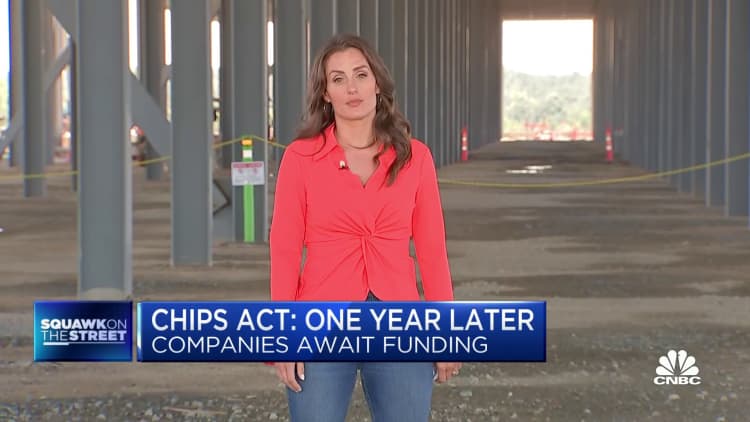
A year after President Joe Biden signed the CHIPS and Science Act into law, the U.S. semiconductor industry is still awaiting the anticipated windfall.
Secretary of Commerce Gina Raimondo stated, “We will commence the distribution of funds later this year. We are urging the team to act swiftly, while ensuring accuracy and precision.”
The objective of the $52.7 billion package was to bring back the semiconductor supply chain to the United States, thereby improving national security by reducing reliance on foreign countries. The legislation also prohibits funding recipients from expanding semiconductor manufacturing in China or other countries identified as national security risks by the U.S. government.
The federal subsidies are intended to assist in mitigating the higher costs associated with establishing these manufacturing hubs, but as of now, no funding allocated by the legislation has been awarded.
Raimondo disclosed that the Department of Commerce has received “over 460 statements of interest from companies around the world” seeking federal funding for their projects. This represents an increase from the agency’s previous update, which stated “nearly 400.”
US Commerce Secretary Gina Raimondo discusses the impact of the semiconductor chip shortage at UAW Region 1A office in Taylor, Michigan on November 29, 2021.
Jeff Kowalsky | AFP | Getty Images
The potential for federal funding has sparked significant investments in the semiconductor sector. According to the White House, a total of $231 billion has been announced in private sector semiconductor investments in the United States. However, many of these projects are contingent upon receiving federal government aid.
Integra Technologies, for instance, plans to construct a 1-million-square-foot facility in the Wichita, Kansas area to provide semiconductor packaging and other services, subject to receiving federal funding. Integra CEO Brett Robinson emphasized, “The back-end semiconductor manufacturing sector that Integra participates in operates on very thin margins that make it impossible to proceed without the support of the CHIPS Act.”
The establishment of this facility would result in the creation of nearly 2000 direct, high-paying jobs. Robinson added, “Once the facility is operational, the company can sustain the business without further government support. However, the construction of the facility requires significant time and cost, necessitating government assistance.”
SkyWater Technology, a pure-play technology foundry, is in the planning stage of its $1.8 billion plant in West Lafayette, Indiana. The company is already collaborating with coalitions to identify construction workers, but breaking ground is dependent on receiving federal funding and determining the amount. CEO Tom Sonderman stated, “Once funding starts flowing, we can initiate the process as quickly as possible. I’ve been impressed by the government’s preparedness and commitment.”
The Department of Commerce has hired 140 staff members dedicated to evaluating CHIPS Act applications, and officials are actively engaging with many potential recipients, according to a senior Commerce Department official.
While companies anticipate federal funding, several larger semiconductor firms have commenced expansion without any CHIPS Act funding. Intel, Taiwan Semiconductor Manufacturing Company, and silicon carbide producer Wolfspeed have all initiated recruitment and construction processes.
When questioned about the necessity of government funding for the world’s largest chip contractor, TSMC Arizona President Brian Harrison responded, “It is required and will be used for the construction, outfitting, and equipment of these two factories.”
Despite the impressive marketing campaigns, presidential visits, and public announcements promising billions of dollars in chip investments, not all applicants should expect to receive aid. A senior Commerce Department official acknowledged, “We will face difficult choices regarding how we allocate our capital. Some applicants will inevitably be disappointed.”
Denial of responsibility! VigourTimes is an automatic aggregator of Global media. In each content, the hyperlink to the primary source is specified. All trademarks belong to their rightful owners, and all materials to their authors. For any complaint, please reach us at – [email protected]. We will take necessary action within 24 hours.


